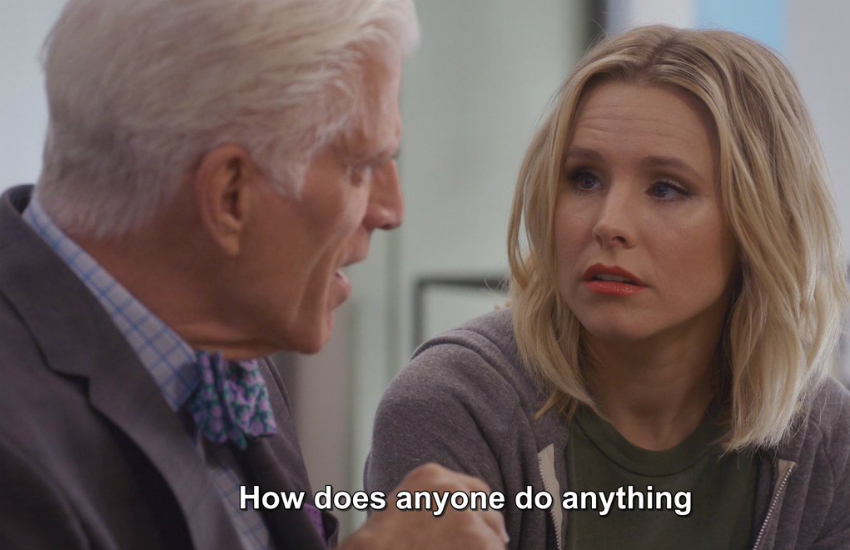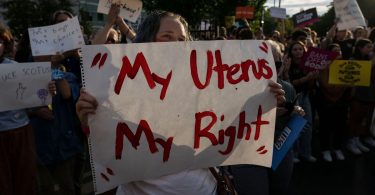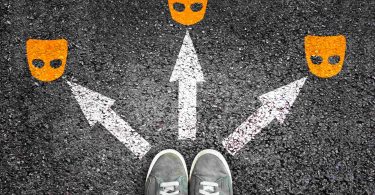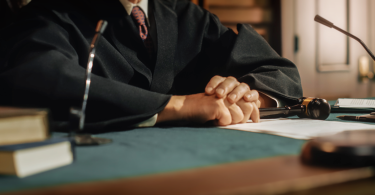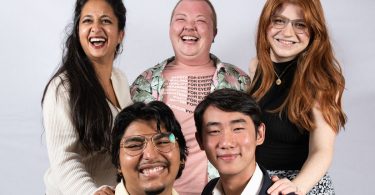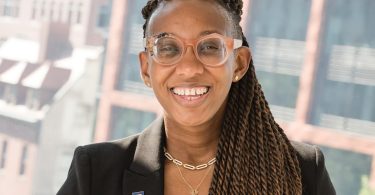The Good Place is so forking good it’s probably my favorite TV show right now. The characters are horribly flawed, the premise is bleak, and the jokes ridiculous, which are all reasons to love it. But the show has garnered a massive queer following from its two seasons.
Is it just because it beats the shirt out of other programs? No. Like The Good Place itself, there’s something else lurking underneath. A very queer undercurrent.
WARNING: Spoilers ahead!
The show follows Eleanor Shellstrop, who via some sort of supernatural clerical error has ended up in a non-religious version of heaven. Not wanting to be banished to hell (The Bad Place), she enlists the help of philosophical ethics teacher and fake soulmate Chidi Anagonye to make her a better person using philosophy.
However, it turns out that the two of them, including characters Tahani Al Jamil and Jason Mendoza, are actually in a special version of The Bad Place, designed to make them torture each other. Hell is other people, of course.
Yet the parallels to this world and the world LGBTI people find themselves in are striking – and quite bleak.
The queer reality they find themselves in
While the show doesn’t have any explicit LGBTI characters (the closest non-demon LGBTI character is Eleanor’s burgeoning sexual awakening with Tahani), it’s the story that’s queer by the way it runs parallel to the real-world LGBTI reality. It’s all sub-text.
The gang are trapped in a society with pressures that mimic our own, but with more frozen yogurt | Photo: @nocontextgp/Twitter/NBC
The queer narrative begins in season one. Eleanor appears in The Good Place, where everyone acts perfect. There’s a certain way to live your life in this version of heaven: happy, generously, and constantly looking out for other people.
Eleanor can’t do this, not simply because she’s ‘bad’, but because this whole way of behaving is an impossible-to-reach construct. Eleanor is then forced to challenge her entire personality to fit in and not face punishment.
Not just the objectively selfish bits, but completely innocuous beliefs like hating clowns or not finding garbage collection fun like a total weirdo.
Being forced to change your behavior to avoid punishment is completely queer. Growing up – and often when grown – LGBTI people must act differently, whether that’s toning down the camp or even forcing themselves to be with a gender they aren’t attracted to, just to escape punishment.
In Eleanor’s case, failure to do this is hell. In the real world, it’s everything from violence to death.
Be like Chidi, do philosophy
Like the show, philosophy shines a light here. Michel Foucault in his text Discipline and Power: The Birth of the Prison, writes that societal structures force us to self-discipline.
‘Disciplinary power, on the other hand, is exercised through its invisibility; at the same time it imposes on those whom it subjects a principle of compulsory visibility. In discipline, it is the subjects who have to be seen. Their visibility assures the hold of the power that is exercised over them. ‘
We punish ourselves by changing our behavior to be seen to fit into society, just so we escape worse punishment by that society.
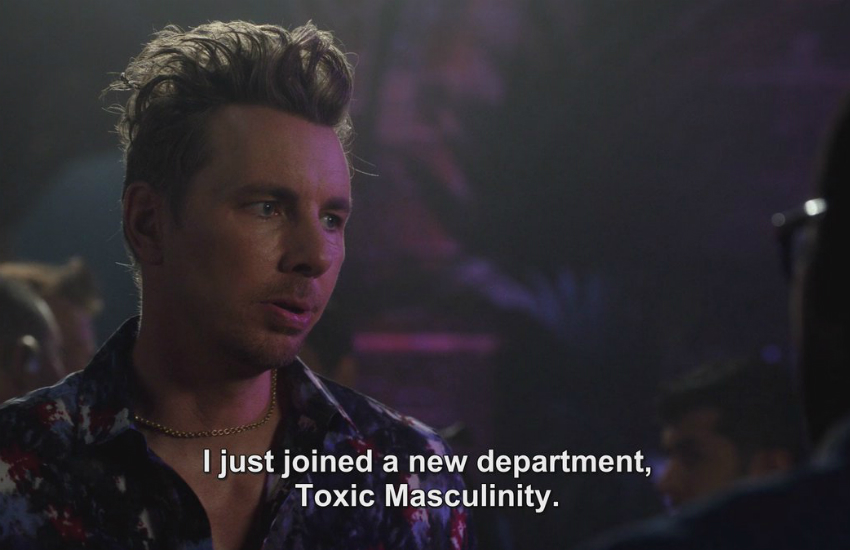
Did I mention most of the demons are Dude-bros? | Photo: @nocontextgp/Twitter/NBC
Eleanor must be seen to be doing what society perceives as morally good or risk being punished by being thrown into literal hell. If that’s not the most LGBTI experience you’ve ever heard about, where do you live, because I need to visit.
It’s even deeper with Jason: someone who loves his identity so much, but is made by everyone else to behave another way (as a silent Buddhist monk) by Eleanor and gang for fear of punishment being inflicted on all of them. Group self-policing, we call that in woke circles.
When it’s revealed The Good Place is actually The Bad Place, Tahani’s behavior then has its own queer parallel. Tahani behaves in this false-good way not because she’s really ‘good’; she’s being punished in The Bad Place too.
It’s because she’s grown up believing that if she behaves in what people believe is a morally perfect way, she’ll be able to win the affection of those around her – and her parents. That’s literally the moral version of putting ‘straight-acting’ on your Grindr profile.
Is society really The Bad Place?
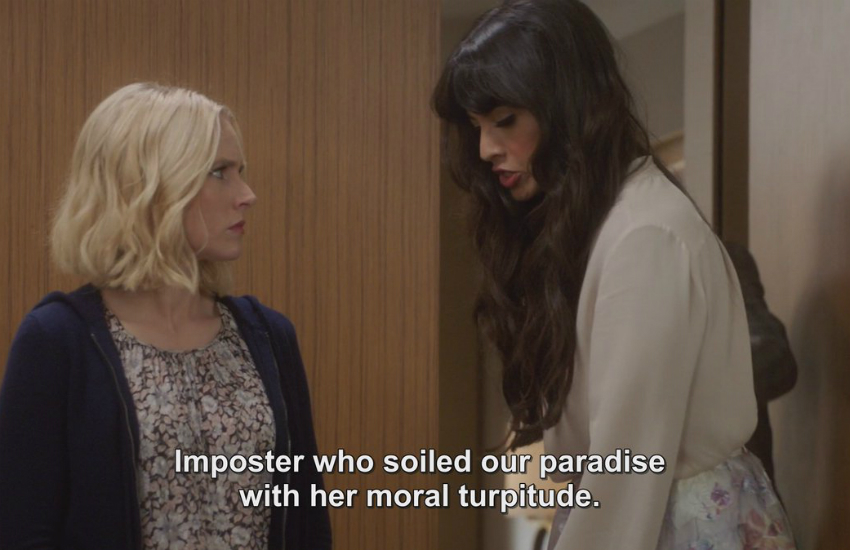
These power structures turn us against each other, especially when you’re Tahani | Photo: nocontextgp/Twitter/NBC
How the universe actually decides who is in the real Good Place or Bad Place is unnecessarily cruel. Only a tiny percentage go to heaven, with billions of others going to hell to be tortured in horrific ways. And it’s a system you seemingly can’t fight against.
Being part of a society where no matter how hard you work, how ‘good’ of person you are, and how much you follow the rules, you can still be disproportionately and arbitrarily punished. That’s something we can all relate to.
Yet for queer people – and minority groups in general – this is how the real world works every day. No matter how hard you try, the world is often structured against you.
Still, with all this hopelessness and parallels to the worst bits of our own world, the show’s primary message is one of hope. It’s so, so funny. Despite the evil reality, it treats the world with an unstoppable lightness.
It shows you can be horribly flawed and become a better person. You can be in hell and still find friends. Hell is other people, but they’re also your way to heaven. LGBTI people know that.
This is why we stick together. This is why we like The Good Place so much.
More from Gay Star News:
Netflix’s LGBTQ Film section is mostly gay men and people aren’t happy
Meet Sabrina the Teenage Witch’s pansexual cousin in new Netflix series
Is new Netflix show Insatiable really homophobic, biphobic and fat-shaming?

